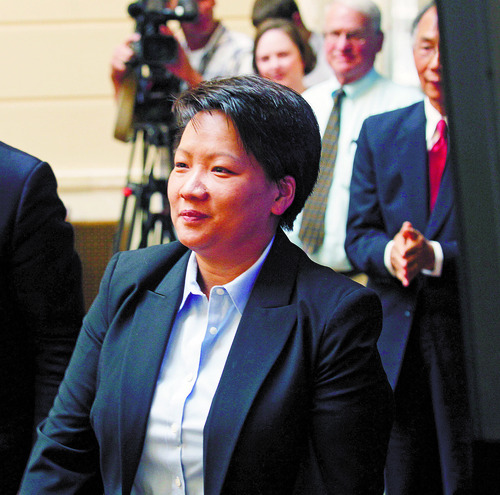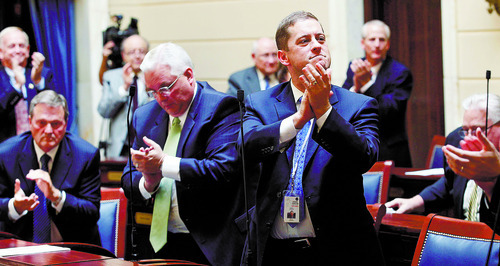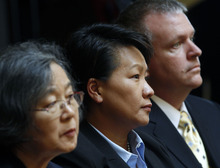This is an archived article that was published on sltrib.com in 2012, and information in the article may be outdated. It is provided only for personal research purposes and may not be reprinted.
In a vote that split Senate Republicans, Su J. Chon on Wednesday became one of Utah's two newest judges, and the first minority to earn a spot on the bench under Gov. Gary Herbert.
The Utah Senate voted 17 to 10 to confirm Chon, despite the controversy that followed a Monday hearing that saw Chon become the first judicial nominee in memory to fail to get a favorable appointment from a Senate confirmation committee. In that hearing, senators said they were concerned about Chon's lack of experience, having never taken a case to trial.
"I want to assure you I will apply the same dedication and hard work that I've applied to every job I've had," Chon told the Capitol crowd following the vote. "And I will make you proud in several years."
But members of the Utah Minority Bar Association questioned whether other motivations nearly prevented Chon from being confirmed to the 3rd District bench.
"What message does that send to the minority legal community? That's going to have a very chilling effect on getting applications from minority people," Salt Lake attorney Mike Martinez said.
Sen. Margaret Dayton, R-Orem, said she was "offended for" Chon, an immigrant from Korea, for being portrayed as a "minority candidate" in a "so-called post-racial" America.
"I feel bad that this is how this is represented," she said.
Jesse Nix, the Utah Minority Bar Association's president-elect, said he "gasped" when he heard Dayton's "post-racial" remark. "That's easy to say for a white senator," he said. Chon's confirmation means just five of the state's 71 district court judges are racial or ethnic minorities. "It's not representative of the public," Nix said.
All seven Senate Democrats voted in favor of confirmation, while Republicans split 10 to 10 in favor of confirmation. Senate President Michael Waddoups and Sen Majority Leader Scott Jenkins, R-Plain City, voted against Chon on Monday.
Sen. Steve Urquhart, R-St. George, said he has worked with Chon in the past, calling her a "wonderful person and a wonderful lawyer," before casting an aye vote.
Sen. Stuar Reid, R-Ogden, said the discrepancy between the Governor's nominating committee and the Senate confirmation committee "highlights a problem in the system" and called for a look at possible reforms.
At the Monday hearing, senators peppered Chon with questions about the death penalty, requiring public school children to say the Pledge of Allegiance and property rights.
But it was Chon's experience — or lack thereof — that senators said led to the 4-2 rejection.
Chon, an attorney of 18 years and the Bar's 2005 pro bono attorney of the year, has worked for two law firms and, currently, the Office of the Utah Property Rights Ombudsman, but has never argued a case at trial.
"I want you to know you've caused as much of a fear amongst this body as we've had in a while," said Jenkins, who also called Chon "a delightful person" and "everything I expected you to be."
"But there's no question that compared to the resumes we've received in the past, I would consider your resume shallow," Jenkins added. "... I do believe this is a mountain for you to climb."
Chon said she has been spending vacation days at courthouses, watching proceedings and talking with prosecutors and defense attorneys.
"She's not afraid of attacking a learning curve. She's not afraid of long hours," Assistant Utah Attorney General Randy Hunter told the senators. "I have no fear that she'll be able to climb that mountain rapidly."
Despite voting against her, Jenkins called Chon "the American story."
Chon's family moved from Korea to the United States when she was a child. "My parents came to America with two daughters, two suitcases, $300 and a dream for a better life," she said.
Her first memories are in Provo, of fields and cherry farms and rodeos.
Her father had an engineering degree from a Korean university, but needed to complete additional courses in America. He worked retail and construction jobs to support his family. Chon and her parents became citizens in 1976. Her family scrimped and saved to send seven daughters to college, she said.
After watching the Senate panel reject their daughter Monday, Chon's parents embraced her following the successful confirmation vote on Wednesday.
Following the confirmation, Jenkins told her there should be "no hard feelings," despite the controversy.
"We respect you," Jenkins said, "and will watch your career closely and we wish you the best."
Twitter: @aaronfalk —
The Utah Senate vote on Su Chon
Yeas (17)
Adams; Anderson;Bramble; Christensen; Davis; Jones; Mayne; McAdams; Morgan; Niederhauser; Osmond; Robles; Romero; Stevenson; Urquhart; Van Tassell; Weiler
Nays (10)
Dayton; Hillyard; Jenkins; Knudson; Madsen; Okerlund; Reid; Stephenson; Thatcher; Waddoups
Absent (2)
Hinkins; Valentine —
The Utah Senate vote on Su Chon
Yeas (17)
Adams; Anderson; Bramble; Christensen; Davis; Jones; Mayne; McAdams; Morgan; Niederhauser; Osmond; Robles; Romero; Stevenson; Urquhart; Van Tassell; Weiler
Nays (10)
Dayton; Hillyard; Jenkins; Knudson; Madsen; Okerlund; Reid; Stephenson; Thatcher; Waddoups
Absent (2)
Hinkins; Valentine







